
The best banks for startups should provide businesses with an excellent low- or no-fee checking account, business support products, and specific services geared toward startups. Having outstanding lending products, such as lines of credit and SBA loans can assist new businesses with needed funding for growth and expansion. You should also choose a provider that offers scalable products and services as your business grows.
After reviewing over 100 banks, here are the 10 best banks for a startup business, with links directly to the provider:
- Chase Member Federal Deposit Insurance Corp. (FDIC). : Best overall bank for startups with full-service banking
- Mercury Provider is a fintech platform backed by and FDIC-insured through supporting bank partnerships with Choice Financial Group and Evolve Bank & Trust : Best digital bank for larger-scale incorporated startups
- Bluevine Provider is a fintech platform backed by and FDIC-insured through a supporting bank partnership with Coastal Community Bank. : Best for earning interest on smaller balances and best business line of credit
- Novo Provider is a financial technology (fintech) platform backed by and FDIC-insured through a supporting bank partnership with Middlesex Federal Savings. : Best digital-only bank for rapid access to funds and faster payments
- U.S. Bank Member FDIC : Best for free business checking with a traditional bank
- Bank of America Member FDIC. : Best for ongoing rewards and low cash deposit fees
- Grasshopper Member FDIC. : Best for earning interest on larger checking balances
- Found Provider is a fintech platform backed by and FDIC-insured through a supporting bank partnership with Piermont Bank. : Best digital-only provider for self-employed startups
- Lili Provider is a fintech platform backed by and FDIC-insured through a supporting bank partnership with Choice Financial Group. : Best for startups needing digital tax preparation assistance
- Brex Provider is a fintech platform backed by and FDIC-insured through partnerships with multiple banks. See Brex’s website for the complete list. : Best business account for startups and scaled companies
Best Banks for Startups at a Glance
Chase: Best Overall Bank for Startups With Full-service Banking
What We Like
- $300 bonus when you open an account
- Multiple ways to waive the monthly fee
- Branch presence in 48 states
Drawbacks
- Limited number of free transactions
- Does not earn interest
- Fee for cash deposits of more than $5,000 per statement period
Features
- Built-in card acceptance with QuickAccept℠ via the Chase Mobile® app
- Manage debit, deposit, and ATM card settings for individual employees
- Deposit checks, view account balances, pay bills, and make transfers through the mobile app
- Integrates with QuickBooks and other leading accounting software
- Free debit card, mailed within 10 business days of application approval
- Physical checks’ costs depend on type ordered
- Chase Payment Solutions
- Live customer support online or in branch during business hours
- Other products include business savings, CDs, lending products, credit cards, merchant services, and collection services
When to Choose Chase
- You want all the products and services offered by a traditional bank
- You prefer the convenience of both branch and online access
- You like to have both personal and business banking with one bank
Chase is the best bank for startup businesses looking for a full-service traditional bank. It offers three different business checking options with waivable monthly fees that can scale as your business grows. This is why it is considered one of the best small business checking accounts on the market.
- Credit cards (see our list of the top-recommended Chase credit cards)
- Lines of credit and SBA loans
- Payment processing and accounting software solutions
- Commercial lending solutions, including commercial real estate (CRE) loans
- Cash flow management tools
On WalletHub[1], Chase Business Complete Banking has 3.3 stars, while Chase has 3.8. Few reviews about the business checking product are available. Two clients had an issue with the minimum balance requirement to waive the monthly fee, while other reviewers of the bank in general were pleased with the bank’s customer service.
Chase business checking accounts are non-interest earning. Consider the fintech Bluevine, which offers accounts with high APYs if you meet the qualifying activity requirements.
Mercury: Best Digital Bank for Larger-scale Incorporated Startups
What We Like
- No monthly maintenance fees
- Physical and virtual debit cards
- Treasury product offers outstanding yield on balances over $500,000
Drawbacks
- Accounts unavailable to sole proprietorships and trusts
- Physical checkbooks unavailable
- Limited lending options and no cash deposits
Features
- Earn interest with Mercury Treasury product if you have more than $500,000
- Set customer user permissions for your team members
- Create auto-transfer rules for your accounts
- Integrate accounts with QuickBooks and Xero accounting software
- Virtual debit cards available right away with physical cards mailed within a few days
- Business payment integrations with Shopify, Stripe, Amazon, and PayPal
- Up to $5 million FDIC insurance via partner banks and sweep networks
- Email customer service available
- Savings account provided when you open checking account
- Other products include capital and venture debt, and credit card
When to Choose Mercury
- You’re a business owner who doesn’t need a business bank with a physical location
- Your company doesn’t need to deposit cash
- You’re a startup or tech company looking for a fee-free business banking experience
- You’re a business owner with large reserves seeking higher FDIC insurance protection
Mercury is a fintech banking product made with startups and tech companies in mind. Its checking and savings accounts are completely free, with no minimum deposit or balance requirements.
The biggest perk of Mercury is its Vault product. Mercury will use partner banks and a sweep network to extend your FDIC insurance to up to $5 million. Most businesses incorporated in the US are eligible for an account, except sole proprietorships and trusts.
- Interest-earning account Mercury Treasury The Mercury Treasury rate is 5.40% and is subject to change at any time. (available for balances of over $500,000)
- Outstanding software integrations
- Discounts and special offers for the best startup tools (see Mercury’s Perks page)
- International wire transfer support (more than 200 countries and over 30 currencies)
Mercury has earned mostly positive reviews on Trustpilot[2], with an average rating of 3.8 out of 5. Users raved about the lack of monthly fees and their great online and mobile experience. However, some clients found the threshold to earn interest a little too high.
Mercury’s drawbacks are the inability to deposit cash and lack of access to lending products outside of the credit card and a venture capital term loan program. A good alternative would be Chase, an established bank that offers different loan programs.
Bluevine: Best for Earning Interest on Smaller Balances & Best Business Line of Credit
What We Like
- Three checking options with competitive interest
- Integrates with QuickBooks
- Unlimited 1.5% cash back business Mastercard
Drawbacks
- No savings, money market, and certificate of deposit (CD) accounts
- No physical branch locations
- Fee for depositing cash
Features
- No monthly maintenance fee
- No minimum balance requirement
- Reduced standard payment fees for Bluevine Plus and Bluevine Premier checking
- Free debit card (with up to 4 free additional debit cards for authorized users) and two free checkbook orders per year
- Integrates with QuickBooks and Xero
- Connects with business payment solutions, including Wise, Venmo, and Expensify
- Has live customer support from dedicated professionals
- Offers line of credit & credit card product
- Automatic transfers with sub-accounts
When to Choose Bluevine
- You meet the requirements set by Bluevine to earn interest on your checking account
- You need a line of credit; Bluevine leads our roundup of the best small business lines of credit
- You prefer an online-only business bank account provider
For startups looking for an online-only financial provider with interest-bearing checking and the best line of credit product on the market, Bluevine is a great choice. You can earn 2.0% APY under its Standard Checking on balances up to $250,000 if you spend $500 a month with the debit card or receive $2,500 in customer payments in a month.
For startups with larger balances, Bluevine also has premium checking products—Bluevine Plus and Bluevine Premier—with higher interest rates, reduced standard banking fees, and extended FDIC insurance of up to $3 million. See our Bluevine business checking review for more details.
Bluevine has earned solid reviews on Trustpilot[3] with a rating of 4.3 out of 5. Startups seem to appreciate how easy it is to open an account and the company’s responsive and professional online customer service. There were a couple of negative reports regarding phone support.
While Bluevine allows users to deposit cash at Green Dot locations and Allpoint+ ATMs, fees can add up for frequent cash deposits. Cash-reliant startups can opt for Bank of America, which offers a $7,500 free cash deposit allowance for its starter business checking account.
Novo: Best Digital-only Bank for Rapid Access to Funds & Faster Payments
What We Like
- Monthly refunds up to $7 in ATM fees
- No maintenance fees
- Novo Boost and Express ACH allow faster access to your funds
Drawbacks
- Unable to deposit cash directly
- Lack of savings accounts
- Noninterest drawing account
Features
- Integrates with other business tools, such as QuickBooks, Xero, Stripe, Square, PayPal, Wise, and Shopify
- Set aside funds for taxes and other large business expenses with Novo Reserves
- Deposit checks directly through the mobile app
- Online banking includes unlimited invoicing and bill pay
- Novo Boost in coordination with Stripe allows you to access funds faster
- Express ACH lets you accept or receive same-day ACH payments
- Quick financing option, merchant cash advance up to $75,000
- Virtual debit card available immediately, one free physical debit card per user
- Paper checks can be sent straight from the app
- Live customer support from dedicated professionals
When to Choose Novo
- You use Stripe and want quick access to your funds
- Your business withdraws cash from ATMs frequently
- You are satisfied with receiving small business financing via a merchant cash advance (MCA)
For startups that receive payments regularly through Stripe, Novo is an excellent option. With Novo Boost, you can receive payments from your Stripe account faster than other providers. Novo also offers Express ACH, which lets you send and receive same-day ACH payments. The ability to receive and send payments rapidly gives Novo a huge advantage over other fintechs.
- Up to $7 in ATM fees refunded
- Up to 20 reserve accounts offered
- Unlimited invoicing and robust accounting and payment software integrations
- Paper checks can be sent from the app even if you cannot order checkbooks
Novo has mostly positive reviews on Trustpilot[4] with a rating of 4.4 out of 5. Many users praised it as a great choice for small businesses and startups due to the lack of monthly fees, ease of account setup, and useful analytical tools and software integrations. Others said they are satisfied with the ease of navigating the platform and the high level of customer support.
Novo lets you apply for quick business financing online, but it’s limited to MCAs. A good alternative for a wide range of lending products to choose from is a traditional bank, like U.S. Bank.
U.S. Bank: Best for Free Business Checking with a Traditional Bank
What We Like
- No monthly fee
- Free mobile check deposits
- Apply in person, online, or by phone
Drawbacks
- Expensive wire fees
- Limited free transaction
Features
- Send and receive money through app
- Digital invoicing and payment systems integrated into your online dashboard
- Mobile app to monitor all of your accounts, transfer funds between accounts, and deposit checks online
- Easy integration with overdraft protection or credit card processing services for your business
- Free debit card and 50% discount on first check order up to $50
- Integrations with QuickBooks and U.S. Bank Payment Processing
- Customer service online, by phone, or in-branch during business hours
- Other products include lending and cash flow products, other checking options, and point-of-sale (POS) services
When to Choose U.S. Bank
- You are looking for a business checking account with no monthly fees
- Your cash deposits don’t exceed $2,500 per month
- You want a cashback bonus for opening a new U.S. Bank account
For startups looking for a traditional bank with free business checking, U.S. Bank is another great traditional bank option. Its business checking accounts are available nationwide. Its basic account, Silver Business Checking, has no monthly fee—plus, you get 125 free monthly transactions and up to $2,500 in free cash deposits.
You can earn up to an $800 bonus when you open a new, eligible U.S. Bank business checking account online (promo code: Q2AFL24) and complete qualifying activities, subject to certain terms and limitations—offer valid through August 30, 2024. Member FDIC.
- Two higher-tier accounts with waivable monthly fees and more free transactions
- Wide range of lending products, such as term loans, lines of credit, and SBA loans
- Nonprofit checking has no monthly fee and a high fee-free transaction allowance
U.S. Bank has a decent rating on WalletHub[5] with a 3.9 out of 5. Note that WalletHub includes ratings for all of the bank’s products and services, so this rating may not apply to the bank’s business checking. There are mixed reviews regarding the bank’s customer service, while many of the negative comments were left by users who were turned down for lines of credit.
For cash-reliant businesses, a higher free cash deposit limit is essential. Consider opening Bank of America’s basic checking account to deposit cash up to $7,500 without paying extra fees.
Bank of America: Best for Ongoing Rewards & Low Cash Deposit Fees
What We Like
- 200 free transactions per month
- Free digital tools to track business performance
- Ongoing rewards
Drawbacks
- Doesn’t earn interest
- Doesn’t offer ATM fee reimbursements
- Requires a $100 opening deposit
Features
- Deposit checks, view accounts, make transfers, and pay bills with the mobile app
- Credit card processing and payroll services through ADP
- Cash Flow Monitor®, a cash management tool, lets you connect accounting, analytics, and payroll apps to help you make business decisions
- Check your business credit score through a partnership with Dun & Bradstreet
- Free debit card
- Physical checks’ cost varies depending on type ordered
- Integrations with QuickBooks, TurboTax, and Zelle
- Customer service during business hours in branch and via phone or via social media messages
- Merchant services available through Expensify
- Other products include business savings, CDs, lending products, and financial analysis through Merrill Financial Advisor
When to Choose Bank of America
- You want to earn rewards from your checking account
- Your business makes large cash deposits each month
- You prefer the convenience of both branch and online access
Bank of America, one of the best banks for startup businesses, is a traditional institution. It offers multiple checking options and full-service business banking products and services. It has two business checking accounts with monthly fees that can be easily waived.
- Up to $500 in combined cashback and credit card statement credits (See Bank of America’s welcome offer)
- 25% to 75% bonus rewards on credit cards Available under the Preferred Rewards for Business program. (check out our list of the top Bank of America business credit cards)
- 5% to 20% higher interest rates on business savings accounts Available under the Preferred Rewards for Business program.
- Business savings, lending, and financial analysis through Merrill financial advisor
- Business credit score checking through the app in partnership with Dun & Bradstreet
WalletHub[6] users rated Bank of America’s Business Advantage Fundamentals Banking 3.3 out of 5. There are fewer than 80 reviews specific to its business checking. Most of the written reviews are negative, with complaints of being turned down for business accounts or having accounts closed. However, some clients said they had not encountered any issues with the bank.
Although Bank of America’s monthly maintenance fees are waivable, you need to meet certain conditions. If you prefer to open an account with no monthly fees and waiver requirements to meet, consider U.S. Bank’s Silver Business Checking.
Grasshopper: Best for Earning Interest on Larger Checking Balances
What We Like
- Cash back on debit card purchases
- Interest-bearing account
- No monthly fees or transaction fees
Drawbacks
- No physical locations
- Minimum deposit required to open
- Cash deposits not accepted
Features
- Free physical and virtual Visa® rewards debit cards
- Unlimited 1% cash back on online and signature-based purchases
- Free bill pay, check deposit services, and digital invoicing tools
- Free domestic ACH and wire transfers when a balance greater than or equal to $25,000 is maintained
- International US dollars (USD) and foreign exchange (FX) wire transfers also available
- Autobooks, QuickBooks, and Plaid integrations with additional financial data management tools available
- Access to multimillion-dollar FDIC insurance up to $125 million
- Earn up to 4.0% APY on balances greater than $50,000 when bundled with an Accelerator Savings Account
- Personalized support from a US-based Client Services team available by phone, email, chat, and secure message
- Other products include savings accounts, startup banking services, treasury management, CRE loans, and SBA loans
When to Choose Grasshopper
- You need an interest-bearing business checking account designed for startups
- You want cash back rewards on online and in-store debit card purchases
- You seek a digital bank that has great integrations with QuickBooks and Autobooks Autobooks is payment software provided for free by Grasshopper Bank.
Grasshopper is a digital-only bank catering to startups. It offers Accelerator Checking, an account that earns up to 2.25% APY uncapped with no minimum balance requirement There is no minimum or cap on balances to earn APY, but customers must maintain a minimum average balance of $10,000 with no nonsufficient funds (NSF) items during the preceding 12 calendar months. and monthly fee. If you open an Accelerator Money Market Savings Account Opening an Accelerator Money Market Savings Account requires opening Accelerator Checking and a balance of $50,000 and up. , you get an APY of 4.0%.
Grasshopper’s Accelerator Checking also provides free bill pay, domestic wire transfers, and ACH if you maintain an account balance of $25,000 or greater. Additionally, you can join a community of investors for fundraising support through Grasshopper Connect.
Grasshopper has a rating of 3.5 out of 5 on Trustpilot[7]. Users who left positive reviews lauded the bank’s seamless account creation, lack of account fees, and easy interest-earning potential. Other reviewers were highly satisfied with the company’s outstanding customer service. A few complained about the length of time it took for funds to be accessible.
One of Grasshopper’s few drawbacks is that it doesn’t accept cash deposits. If you need to deposit cash regularly, consider an account with Bank of America to access a monthly cash deposit allowance of $7,500.
Found: Best Digital-only Provider for Self-employed Startups
What We Like
- No monthly fees, minimum balances, account fees, and sign-up fees
- Excellent expense tracking on both its desktop and mobile apps
- Helps you track tax write-offs and gives you real-time tax estimates
Drawbacks
- No lending products
- Interest earning only through paid-tier Found Plus
- Cannot purchase checks or issue them from the app
Features
- Provides a business debit Mastercard, which allows you to track expenses and receive purchase alerts
- Debit cards can be frozen in the Found app
- Desktop and mobile apps
- Connect to accounting software and payment apps, such as Cash App, PayPal, Square, Venmo, and eBay
- Integrated bookkeeping allows you to categorize expenses, customize invoices, capture receipts, and set custom rules
- Track tax write-offs in the app
- View your tax estimate update in real-time
- Pay your taxes directly from the app
- Send your Schedule C directly from the app
- Allows cash deposits at over 79,000 retail locations
- Customer service via email, online form, and support guides on the website
When to Choose Found
- You’re a freelancing startup looking for detailed expense tracking
- You’re a startup business owner looking for tax preparation assistance
- You’re a self-employed startup business owner sending frequent invoices
Found is an excellent choice for freelancers or self-employed professionals looking for startup banking. It offers a great all-in-one product that provides integrated bookkeeping and robust tax tracking and preparation software. These features are invaluable to single-owner startups.
The integrated accounting software helps you categorize expenses, capture receipts, and set custom rules. You also get unlimited free invoicing that can be customized with your company’s logo and colors. Additionally, invoice payments can be accepted through payment apps.
- Unlimited transactions for Found’s fee-free business checking
- Request and manage W-9s, 1099 payment reports, and 1099-NECs contractor forms
- Cash deposits at more than 79,000 retail locations
- Premium account Found Plus A Found Plus subscription costs $19.99 per month or $149.99 a year. offers 1.5% APY on balances up to $20,000
On Trustpilot[8], Found has an average rating of 4.4 out of 5. Many reviewers were pleased with the free tax planning and invoicing tools available through the app and the company’s exceptional customer service. They specifically mentioned how user-friendly Found is for startup businesses.
If you don’t want to sign up for a paid account to get APY earnings, choose Bluevine. It offers its Standard Checking with no subscription fees and provides a 2.0% interest rate for balances up to $250,000 if you meet the qualifying activities.
NOTE: Found is a financial technology company, not a bank. Banking services are provided by Piermont Bank, Member FDIC. The Found Mastercard debit card is issued by Piermont Bank pursuant to a license from Mastercard Inc. Found’s core features are free. Found also offers a paid product, Found Plus.
Lili: Best for Startups Needing Digital Tax Preparation Assistance
What We Like
- No monthly fees for basic tier
- 4.15% APY on savings accounts
- Paid plans provide tax preparation assistance and bookkeeping tools
Drawbacks
- No physical locations
- Some of the best features are in higher-tier accounts
- No outgoing wire transfers
Features
- Free Visa business debit card
- Mobile banking
- Unlimited invoice creation (Lili Smart and Lili Premium)
- Prefilled tax forms (Lili Smart and Lili Premium)
- Bookkeeping solutions (Lili Pro, Lili Smart, and Lili Premium)
- Two days early payment via direct deposit
- Integrations with QuickBooks, Venmo, PayPal, and CashApp, among others
- Toll-free phone support Monday through Friday, 9 a.m. to 7 p.m. Eastern time, and by email
- Lili Pro available for $9 per month
When to Choose Lili
- You want help with tax preparation since Lili can automatically create your Schedule C
- You seek to create and send unlimited invoices directly in your banking app Available under a Lili Smart or Lili Premium plan.
- You prefer to handle accounting yourself; accept payments and scan receipts in the app Available under a Lili Smart or Lili Premium plan.
Another outstanding choice for startups and freelancers is Lili, thanks to a great business checking product and outstanding tax preparation software built into the app. However, Found has a slight edge over Lili due to the more robust features available in the free version of the app. Read our comparison of Lili vs Found business checking to learn more.
Startups can start with Lili Basic, a fee-free account with no monthly fee, opening deposit, and required minimum balance. You can upgrade to Lili’s paid plans Lili’s paid plans are Lili Pro, Lili Smart, and Lili Premium. to access excellent features, such as tracking potential tax write-offs, using a tax bucket to set aside funds, scanning receipts, completing tax forms, and producing quarterly and annual expense reports.
- Option to get paid faster (two days early) with direct deposit
- Lili Visa debit card with cash back rewards under a paid plan
- Fee-free overdrafts up to $200 and APY of 4.15% for savings Available when you subscribe to Lili Pro, Lili Smart, or Lili Premium.
- Multi-member LLCs, S-corps, general partnerships, and LLPs can sign up for an account
Lili has excellent reviews on Trustpilot[9], earning the company 4.7 out of 5 stars. Many small business owners were delighted with the business expense tracking and invoicing tools, including the tax savings feature. Others were pleased with how the app helped them with their business tax preparation.
Unfortunately, Lili’s wire transfer services are limited to receiving domestic wires. A great alternative is the fintech solution Mercury, which supports both inbound and outbound domestic and international wire transfers and does not charge a fee for this service.
Brex: Best Business Account for Startups & Scaled Companies
What We Like
- No minimum balance or opening deposit requirement
- No opening or maintenance fees
- All ACH and wire transfers are free
Drawbacks
- No ATM card option
- No physical locations and cash deposits in an account
- Tightened qualification requirements may leave your business unable to obtain an account
Features
- No fees on money transfers, including ACH, checks, and wire transfers, both domestic and international
- No opening or maintenance fees
- Uncapped rewards and 10 to 20 times higher limits on Brex Mastercard with no personal guarantee
- Spend management for accounting automation and accuracy
- Partner perks with businesses, such as Amazon Web Services (AWS), Apple, QuickBooks, and UPS
- Powerful mobile app with expense tracking and integrations with popular financial and business software
- Deposits can be spread among multiple member banks that are FDIC-insured for a maximum of $6 million
- Brex support 24/7 by chat or email
When to Choose Brex
- You need to transfer money frequently; all ACH, check, and wire transfers are free
- You don’t need to deposit cash, as Brex does not accept cash deposits
- You don’t need to withdraw money via ATM since Brex debit cards don’t allow it
Geared toward startups, the Brex Business Account has no opening deposit, minimum balance requirement, monthly service fees, and transaction limits. The biggest perk is no wire fees for domestic and international transactions.
To qualify, you must meet one of Brex’s account requirements. If you cannot qualify, see our buyer’s guide of the leading Brex Business Account alternatives.
Both Brex and Mercury target startups. See how each stacks up against the other in our comparison of Brex vs Mercury business checking.
- Money market account with a rate of up to 4.89%, subject to change
- Business card with uncapped rewards (see our review of Brex Card)
- Spend management (see our Brex Empower review)
- Up to $6 million FDIC protection
- Financial planning and modeling for startups
Brex has earned a 2.9 out of 5 rating on Trustpilot[10]. Reviewers said that they are pleased with the Brex Card and how easy they were to control from the app. Some mentioned they save a lot of time through Brex’s integration with bookkeeping apps. Many negative reviews were left when Brex tightened its requirements and closed many accounts.
The Brex Card cannot be used for ATM withdrawals, unlike Novo’s card, which does not charge ATM fees—although third-party fees can apply. In addition, Novo refunds ATM fees up to $7 per month.
How We Evaluated the Best Banks for Startups
When we evaluated the best banks for startups, we considered:
- Monthly fees
- Required opening deposit and balance minimums
- Transaction limits before fees
- ACH and wire transfer fees
- ATM fees and availability
- Cash deposit fees and availability
- Interest yield, if applicable
- Other checking account perks
- Software integrations
- Other business services and lending products provided
- Customer service
- Customer reviews
The Return of Silicon Valley Bank
On March 10, 2023, the startup business banking world was rocked by the failure of Silicon Valley Bank (SVB). While the subsequent failures of Signature Bank and First Republic Bank also hurt business banking customers, startups were heavily impacted by the SVB failure.
However, SVB has returned, now owned by First Citizens Bank. SVB continues to offer the same products and services it did before its failure. If you want to know more about the new SVB, check out our review of SVB business checking.
To protect your business from potential bank failures, consider the following:
- Choose a bank that uses IntraFi Network Deposits: To extend your coverage, IntraFi uses Certificate of Deposit Account Registry Service (CDARS) and Insured Cash Sweeps (ICS) to extend your FDIC insurance up to $150 million. There can be fees involved with this service.
- Select a bank that uses partner banks and sweep networks: Some banks use partner banks and sweep networks to spread your funds into multiple banks, extending your coverage. Mercury, for example, uses this method to increase your FDIC insurance to $5 million.
- Open accounts at multiple banks: You can extend your company’s FDIC insurance by having bank accounts at multiple banks, as each would be insured up to at least $250,000
- Keep enough funds liquid to manage short-term emergencies: If all of your reserves are tied up in timed deposits, you might not be able to liquidate them quickly enough to deal with a short-term emergency. So balance your reserve funds by staggering timed investments, such as CDs that are part of a CD ladder so that you have funds available regularly
What You Need to Open a Business Bank Account as a Startup
Each provider on this list may require different documents to open a business bank account. Generally, you will need:
- Employer identification number (EIN) or Social Security number if you’re a sole proprietor
- Fictitious business name certificate or DBA certificate
- Business formation documents
- Organization documents, including your ownership agreements
- Business licenses
- Government-issued photo ID, such as a passport or driver’s license
See our guide on how to open a business bank account for more details. It includes a downloadable checklist of required documents per entity type.
Frequently Asked Questions (FAQs)
The best traditional bank for startup businesses is Chase, thanks to waivable monthly fees, scalable checking options, and a full range of business support products and services.
While it might be tempting for small businesses, especially startup and freelancer businesses, to use their personal bank accounts for their business expenses, it is not recommended. A business bank account allows you to keep your finances separated, helps you build business credit, and simplifies your business taxes among other benefits.
Yes, you can get startup business loans from a bank. However, a bank is more likely to give a loan to a startup that has an existing business relationship with it. Opening a business bank account will build your business credit and reputation with the bank, making it more likely to lend you business money.
Bottom Line
The institutions on this list can help your startup with all of your banking needs during the early stages of your business development. They offer outstanding business checking products along with other business products and services. When choosing the right provider, consider what products and services you need from your business bank, and then select one that best meets your business needs.





